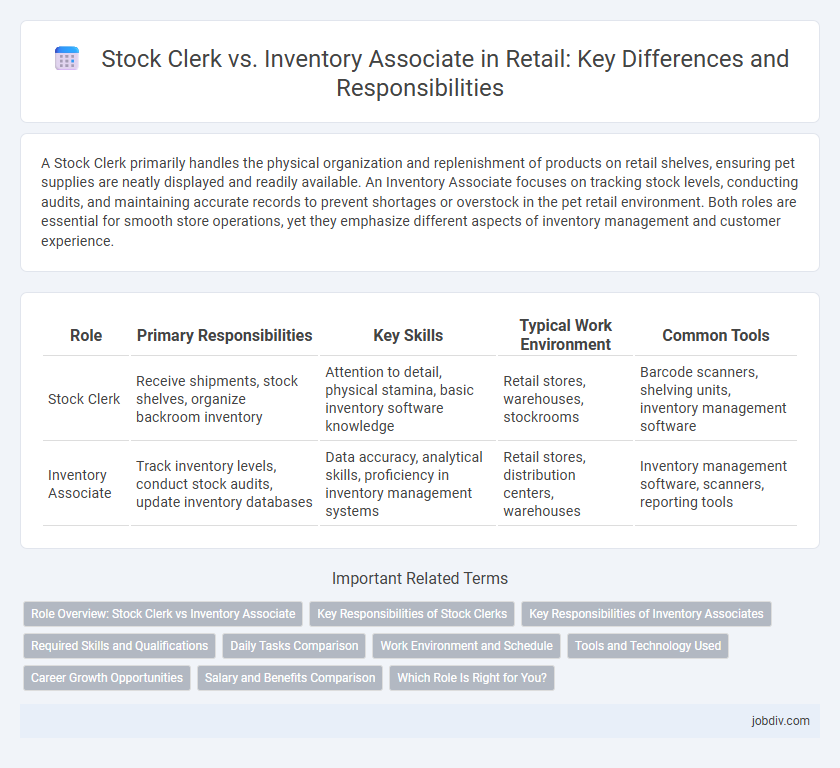A Stock Clerk primarily handles the physical organization and replenishment of products on retail shelves, ensuring pet supplies are neatly displayed and readily available. An Inventory Associate focuses on tracking stock levels, conducting audits, and maintaining accurate records to prevent shortages or overstock in the pet retail environment. Both roles are essential for smooth store operations, yet they emphasize different aspects of inventory management and customer experience.
Table of Comparison
| Role | Primary Responsibilities | Key Skills | Typical Work Environment | Common Tools |
|---|---|---|---|---|
| Stock Clerk | Receive shipments, stock shelves, organize backroom inventory | Attention to detail, physical stamina, basic inventory software knowledge | Retail stores, warehouses, stockrooms | Barcode scanners, shelving units, inventory management software |
| Inventory Associate | Track inventory levels, conduct stock audits, update inventory databases | Data accuracy, analytical skills, proficiency in inventory management systems | Retail stores, distribution centers, warehouses | Inventory management software, scanners, reporting tools |
Role Overview: Stock Clerk vs Inventory Associate
Stock Clerks primarily handle the receipt, organization, and stocking of merchandise on retail shelves, ensuring products are properly displayed and accessible to customers. Inventory Associates focus on tracking stock levels, conducting regular inventory audits, and managing discrepancies to maintain accurate inventory records. Both roles are critical for efficient store operations, with Stock Clerks emphasizing product placement and Inventory Associates prioritizing data accuracy and inventory control.
Key Responsibilities of Stock Clerks
Stock Clerks primarily focus on receiving, unpacking, and organizing merchandise on store shelves to ensure product availability and presentation. They verify shipment accuracy, label items, and maintain stockroom cleanliness to support efficient inventory flow. Their role is critical in minimizing out-of-stock situations and enhancing the customer shopping experience through timely restocking.
Key Responsibilities of Inventory Associates
Inventory Associates manage stock levels by receiving shipments, conducting regular audits, and updating inventory records to ensure accuracy. They coordinate with suppliers to track order status and resolve discrepancies, maintaining seamless stock flow. Their detailed reporting and data entry support efficient inventory control and reduce stock shortages or overages.
Required Skills and Qualifications
Stock Clerks require strong organizational skills and basic inventory management knowledge to accurately receive, unpack, and shelve merchandise. Inventory Associates need proficiency in data entry, inventory tracking software, and analytical skills to monitor stock levels and identify discrepancies. Both roles demand attention to detail, physical stamina, and effective communication to support retail operations efficiently.
Daily Tasks Comparison
Stock clerks primarily focus on receiving shipments, organizing stock, and maintaining orderly shelves, ensuring products are readily available for customers. Inventory associates conduct regular stock counts, track inventory levels using management software, and reconcile discrepancies to prevent stockouts and overstock situations. Both roles are essential for efficient retail operations but differ in their emphasis on physical stock handling versus data accuracy and inventory control.
Work Environment and Schedule
Stock Clerks typically work in fast-paced retail store environments, handling merchandise stocking and customer support on the sales floor. Inventory Associates often operate in warehouses or stockrooms, focusing on inventory management, data entry, and order fulfillment in a more structured setting. Stock Clerks usually have variable shifts aligned with store hours, while Inventory Associates often maintain consistent daytime schedules to match warehouse operations.
Tools and Technology Used
Stock clerks primarily utilize barcode scanners, handheld inventory devices, and basic point-of-sale (POS) systems to assist with stocking shelves and processing transactions efficiently. Inventory associates rely on advanced inventory management software, RFID technology, and data analytics tools to monitor stock levels, track shipments, and optimize inventory control. Both roles benefit from mobile devices and cloud-based platforms that enable real-time updates and seamless communication within retail supply chains.
Career Growth Opportunities
Stock Clerks primarily handle stocking shelves and assisting customers, providing foundational retail experience that can lead to roles such as Sales Associate or Retail Supervisor. Inventory Associates specialize in tracking inventory accuracy and managing stock levels, offering a pathway toward Inventory Management or Supply Chain Coordination positions. Both roles serve as stepping stones in retail careers, with Inventory Associates often advancing into analytical or managerial roles due to their detailed knowledge of inventory systems.
Salary and Benefits Comparison
Stock clerks typically earn an hourly wage ranging from $12 to $17, with entry-level positions offering lower pay and experienced clerks earning towards the higher end. Inventory associates often receive salaries between $14 and $20 per hour, reflecting the added responsibilities of managing stock accuracy and reporting. Benefits for both roles may include healthcare, employee discounts, and retirement plans, but inventory associates are more likely to receive performance bonuses due to their critical role in maintaining inventory integrity.
Which Role Is Right for You?
A Stock Clerk primarily focuses on organizing and replenishing merchandise on store shelves, ensuring products are readily available and visually appealing for customers. An Inventory Associate handles inventory management tasks such as tracking stock levels, conducting audits, and coordinating shipments to maintain accurate records and optimize supply chain efficiency. Choose the role that aligns with your strengths: if you prefer hands-on, physical tasks and direct interaction with store displays, Stock Clerk suits you; if you excel in data accuracy, inventory analysis, and logistics coordination, then Inventory Associate is the better fit.
Stock Clerk vs Inventory Associate Infographic

 jobdiv.com
jobdiv.com